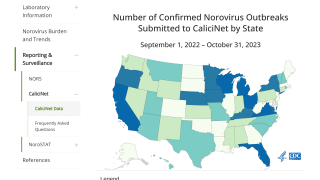Oral Bivalent Norovirus Vaccine Meets Phase 1b Study Endpoints

A California based biotechnology company announced positive topline results from the Phase 1b study with its oral tableted bivalent norovirus vaccine in healthy adults.
This study’s results, published on September 25, 2019, met all primary endpoints for safety and demonstrated robust immunogenicity, with 78 - 93 percent of subjects responding by eliciting IgA antibody-secreting cells (ASC), a key marker for mucosal immunity and a potential correlate of protection for norovirus disease
The oral norovirus GI.1 and GII.4 vaccines were well tolerated, with no treatment-related serious adverse events reported.
Vaxart’s bivalent vaccine demonstrated robust immunogenicity, with an IgA ASC response rate of 78% for the GI.1 strain and 93% for the GII.4 strain for the bivalent cohort of the study, and 86% and 90%, respectively, for the two monovalent cohorts of the study.
There was no interference observed in the bivalent arm of the study.
“These (study) results are in line with the robust immune response profile seen in previous studies with our noro-GI.1 tablet vaccine, while the immunogenicity of our new noro-GII.4 tablet vaccine trended even higher with an IgA ASC response rate of 90% or greater,” said Wouter Latour, M.D., chief executive officer of Vaxart, Inc.
“We are now forging ahead with the Phase 2 dose confirmation study planned for 2020.”
The Phase 1b norovirus bivalent vaccine trial enrolled a total of 80 subjects.
After enrollment of an open-label sentinel GII.4 group of 5 subjects, the remaining 75 subjects were randomized in a blinded manner to one of 4 treatment groups: 15 subjects in each monovalent group received an oral 5x1010 I.U. dose of either the norovirus GII.4 or GI.1 vaccine, 30 subjects in the bivalent group received a 5x1010 I.U. dose of both the norovirus GII.4 and GI.1 vaccine administered concurrently, and 15 subjects received placebo tablets.
The trial was designed to evaluate safety, immunogenicity, and interference of Vaxart’s oral bivalent norovirus vaccine by comparing the bivalent vaccine group to the two monovalent vaccine groups, as well as the placebo group.
The U.S. Centers for Disease Control and Prevention (CDC) estimates that norovirus causes approximately 19 to 21 million illnesses in the United States each year, resulting in 56,000 to 71,000 hospitalizations and 570 to 800 deaths, mostly among young children and older adults.
“Norovirus is a very contagious disease which can be especially harmful to children under age 5, as well as to older adults,” said William Schaffner, M.D., medical director of the National Foundation for Infectious Diseases and Professor of preventive medicine and infectious diseases at Vanderbilt University School of Medicine.
Norovirus is recognized as the leading cause of acute gastroenteritis in the United States. It is a common intestinal infection that typically lasts three to five days and is marked by diarrhea, vomiting, abdominal cramps, nausea, and sometimes fever, says the CDC.
Norovirus symptoms can be more severe in high-risk patients (older adults and young children) and may lead to serious complications, including death. Norovirus causes frequent, debilitating and widespread outbreaks in the military, food industry, travel industry, child care facilities, elderly homes, and healthcare facilities.
In a recent study by Johns Hopkins University and the CDC, researchers estimated the global economic impact of norovirus disease at $60 billion, $34 billion of which occurred in high-income countries, including the United States, Europe, and Japan.
Vaxart, Inc. is a clinical-stage biotechnology company focused on developing oral recombinant protein vaccines based on its proprietary oral vaccine platform.
Norovirus news published by Precision Vaccinations
Our Trust Standards: Medical Advisory Committee
























